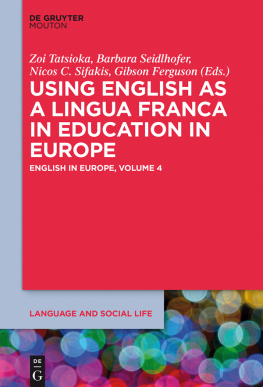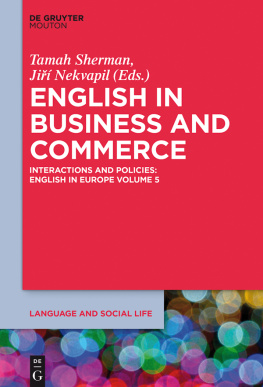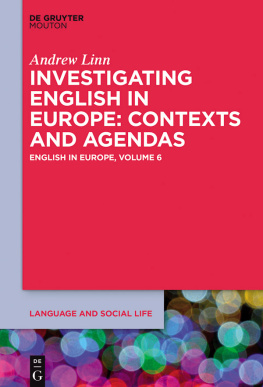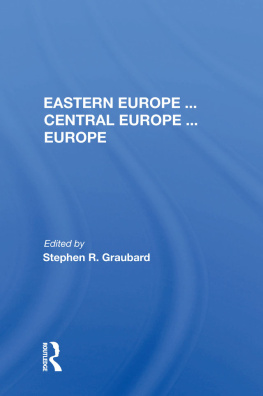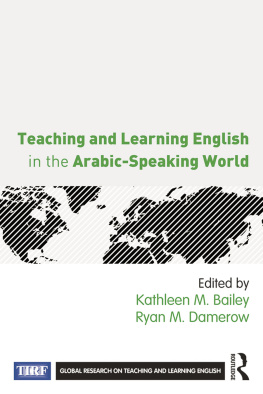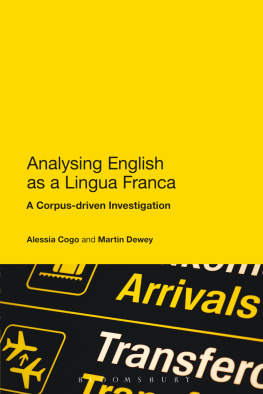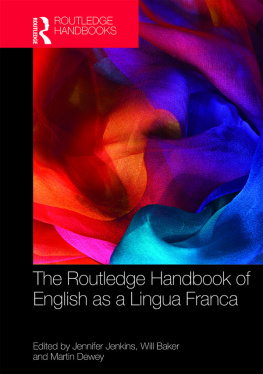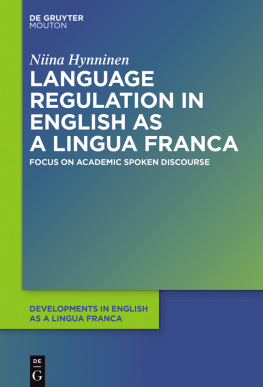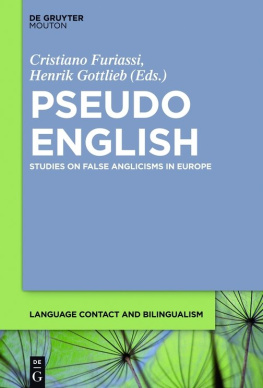Contents
Guide

Using English as a Lingua Franca in Education in Europe
Language and Social Life

Editors
David Britain
Crispin Thurlow
Volume 7
ISBN 978-1-5015-1109-7
e-ISBN (PDF) 978-1-5015-0311-5
e-ISBN (EPUB) 978-1-5015-0297-2
ISSN 2192-2128
Library of Congress Control Number: 2018938923
Bibliographic information published by the Deutsche Nationalbibliothek
The Deutsche Nationalbibliothek lists this publication in the Deutsche Nationalbibliografie; detailed bibliographic data are available on the Internet at http://dnb.dnb.de.
2018 Walter de Gruyter, Inc., Berlin/Boston
www.degruyter.com

This volume is dedicated to the memory of Professor Cem Alptekin (19422014).
Series Preface
The biggest language challenge in the world today is English. School children are expected to learn it; and the need to succeed in English is often fired by parental ambition and the requirements for entry into higher education, no matter what the proposed course of study. Once at university or college, students across the globe are increasingly finding that their teaching is delivered through the medium of English, making the learning process more onerous. Universities unquestioningly strive for a greater level of internationalization in teaching and in research, and this is in turn equated with greater use of English by non-native speakers. The need to use English to succeed in business is as much an issue for multinational corporations as it is for small traders in tourist destinations; meanwhile other languages are used and studied less and less. On the other hand, academic publishers get rich on the monolingual norm of the industry, and private language teaching is itself big business. In the market of English there are winners and there are losers.
The picture, however, is more complicated than one simply of winners and losers. What varieties of English are we talking about here, and who are their native speakers? Is there something distinct we can identify as English, or is it merely part of a repertoire of language forms to be called upon as necessary? Is the looming presence of English an idea or a reality, and in any case is it really such a problem, and is it really killing off other languages as some commentators fear? Is the status and role of English the same in all parts of the world, or does it serve different purposes in different contexts? What forms of practical support do those trying to compete in this marketplace need in order to be amongst the winners?
These are all questions addressed by the English in Europe: Opportunity or Threat? project, which ran from January 2012 to October 2014. This international research network received generous funding from the Leverhulme Trust in the UK and was a partnership between the universities of Sheffield (UK), Copenhagen (Denmark) and Zaragoza (Spain), Charles University in Prague (Czech Republic) and the South-East European Research Centre in Thessaloniki (Greece). Each of the partners hosted a conference on a different topic and with a particular focus on English in their own region of Europe. During the course of the project 120 papers were presented, reporting on research projects from across Europe and beyond, providing for the first time a properly informed and nuanced picture of the reality of living with and through the medium of English.
The English in Europe book series takes the research presented in these conferences as its starting point. In each case, however, papers have been rewritten, and many of the papers have been specially commissioned to provide a series of coherent and balanced collections, giving a thorough and authoritative picture of the challenges posed by teaching, studying and using English in Europe today.
Professor Andrew Linn
Director, English in Europe project
Acknowledgements
We would like to wholeheartedly thank the English in Europe: Opportunity or Threat? project for the financial support in the organization of the conference which took place in Thessaloniki, on 2324 November 2013. We would also like to thank all our English in Europe partners who participated in the blind peer review process of all chapters of the volume, thus ensuring its academic quality and professional standards. Their contribution to the volume, their help, support and guidance have been invaluable.
Zoi Tatsioka, Barbara Seidlhofer, Nicos C. Sifakis and Gibson Ferguson
Introduction
Over recent decades English has assumed an increasingly important role in higher education in Europe, where many universities have introduced English medium graduate courses in their drive to internationalise and recruit fee-paying students. However, in these settings the English language used for communication among students and academics of varied national backgrounds is not so much the standard English of the UK or of any other native variety but English as a lingua franca (henceforth ELF), and it is the challenges and opportunities of this use of English that is the main focus of the present volume.
More specifically, the volume examines ELF in European education with a primary focus on South East Europe (Bulgaria, Croatia and Greece), although the educational contexts of Central (Austria and the Czech Republic) and Western Europe (Spain, the UK) are also explored. Thus, the volume investigates a region where English has only recently assumed the role of a common language following the decline of French in the middle of the 20th century, and Russian after the fall of the Iron Curtain in the 1990s. Countries of this geographical area belong to Expanding Circle and thus they are not associated at all with Britains colonial history, although nativeness is a recurring theme in the volume. Moreover, all the countries whose educational contexts are examined in the following chapters constitute member states of the European Union (EU) and enjoy the benefits of free movement and residence as well as the opportunity to participate in funded educational programmes. All the aforementioned political and social developments have paved the road for the spread of English as a lingua franca in the region. The historical evolution of English as a Foreign Language (EFL) into ELF in different parts of Eastern Europe is discussed below.
1 EFL and ELF in Eastern Europe
English has been taught as a foreign language in the countries of Eastern Europe for a number of decades without having been granted any official status, as all of the countries belong within the Expanding Circle. Although in the past it had to compete with other dominant foreign languages, predominantly French, it has now assumed the role of first foreign language in the region and it is certainly the most widely learnt language followed by French and German ().
claims that there was a delay in the expansion of English in the USSR due to the dominant role of Russian as a lingua franca in Eastern European countries, the popularity of French as a foreign language in the 20th century and the limited contacts with the Western world until the disintegration of the Soviet Union in 1991.

